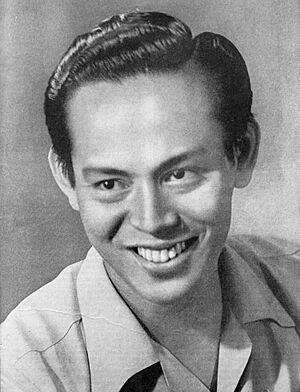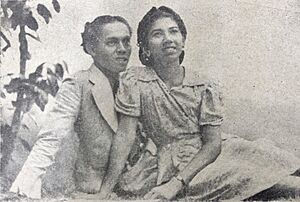Rendra Karno facts for kids
Quick facts for kids
Rendra Karno
|
|
|---|---|

Rendra Karno, 1954
|
|
| Born |
Raden Soekarno
7 May 1920 Kutoarjo, Dutch East Indies
|
| Died | 27 November 1985 (aged 65) Jakarta, Indonesia
|
| Occupation | Actor |
| Spouse(s) |
Djuriah Karno
(m. 1947) |
Rendra Karno (born Raden Soekarno; May 7, 1920 – November 27, 1985) was a famous Indonesian actor. He was born in Kutoarjo, Central Java.
Rendra Karno started his acting career in 1941. His first movie was Soeara Berbisa. Over the next 40 years, he acted in more than 50 films. He also performed in plays during the Japanese occupation of the Dutch East Indies and the Indonesian National Revolution. In 1963, he won an award for best supporting actor at the Asian Film Festival in Tokyo for his role in the 1962 movie Bajangan di Waktu Fadjar.
Contents
Early Life and First Steps in Film
Rendra Karno was born in Kutoarjo, Central Java, on May 7, 1920. His family was noble, which meant he got a good education. He finished his studies and then learned about bookkeeping. His first job was working as a bookkeeper for a movie theater.
In 1941, the Indonesian film industry was looking for young, educated actors. They wanted to make movies more respected by the public. Soekarno was asked by Union Films to act in their movie Soeara Berbisa. This film was about two men who loved the same woman, only to find out they were brothers.
Later that year, he appeared in another Union Films movie called Mega Mendoeng (1942). In this film, he played a young assistant pharmacist. In March 1942, the Japanese army took control of the Dutch East Indies. Union Films had to close, and Soekarno lost his job.
Acting During Wartime
After the film industry closed, Soekarno started working in theater. He spent most of the Japanese occupation with a theater group called Maya. He also acted in one short movie that was made to spread messages from the government, called Di Menara (1943).
After Japan surrendered in August 1945, the Dutch forces returned to Indonesia. This led to the Indonesian National Revolution (1945–1949), a war for Indonesia's independence. During this time, Soekarno was part of a professional theater group called Bintang Soerabaja.
Return to Movies and New Name
In 1948, as the revolution was ending, Soekarno went back to making movies. He got a role in Anggrek Bulan. He worked with Usmar Ismail again, who was helping to direct the film. Soekarno acted in two more movies in 1949: Harta Karun and Tjitra.
When the film company he worked for merged with another, Soekarno joined Fred Young's Bintang Surabaja company. He appeared in several of their films, like Bintang Surabaja 1951 (1950) and Djembatan Merah (1950).
As the 1950s continued, Soekarno worked for many different film companies. He even directed his first movie, Rentjong dan Surat (1953). He became very popular through his work with Perfini studio, especially in the comedy movie Krisis (1953). This film was about different families living in the same house and their funny conflicts. He also appeared in its sequel, Lagi-Lagi Krisis, two years later.
Soon after, Soekarno changed his name to Rendra Karno. This was because President Sukarno asked people to drop old European or noble names, like "Raden".
Standing Up for Indonesian Films

Rendra Karno was also a member of the Indonesian Film Actors Union (PARFI). This group worked to protect the Indonesian film industry. They wanted to make sure that local films could compete with movies imported from other countries like Malaysia, India, and the United States.
On March 12, 1956, Rendra Karno and nine other actors went to Merdeka Palace in Jakarta. They met with President Sukarno to share their concerns. They asked for changes to import laws, for a film library to be created, and for Indonesia to be more involved in international film festivals. However, these requests were not met at that time.
Later Career and Legacy
Rendra Karno continued to work with Perfini into the 1960s. He acted in popular movies such as Tiga Dara (1956), Tjambuk Api (1958), and Pedjuang (1960). His role in Bajangan di Waktu Fadjar (1962) earned him the best supporting actor award at the 1963 Asian Film Festival in Tokyo.
After acting in Takkan Lari Gunung Dikedjar in 1965, he took a break from acting for five years. In 1971, Rendra Karno returned to the Indonesian film industry. He acted in Hutan Tantangan and also helped direct it. Over the next ten years, he appeared in eight more films, including Putri Solo (1974). He also worked behind the scenes on several movies. Rendra Karno passed away in Jakarta on November 27, 1985.
Filmography
During his four decades as an actor, Soekarno (Rendra Karno) appeared in about 52 films. He also directed one movie: Rentjong dan Surat (1953).
- Mega Mendoeng (1941)
- Soeara Berbisa (1941)
- Di Menara (1943)
- Anggrek Bulan (1948)
- Tjitra (1949)
- Harta Karun (1949)
- Bintang Surabaja 1951 (1950)
- Damarwulan (1950)
- Djembatan Merah (1950)
- Ratapan Ibu (1950)
- Bunga Bangsa (1951)
- Bunga Rumah Makan (1951)
- Djiwa Pemuda (1951)
- Terbelenggu (1951)
- Pelarian dari Pagar Besi (1951)
- Selamat Berdjuang, Masku! (1951)
- Chandra Dewi (1952)
- Penjelundup (1952)
- Rodrigo de Villa (1952)
- Kafedo (1953)
- Kassan (1953)
- Krisis (1953)
- Debu Revolusi (1954)
- Kopral Djono (1954)
- Bapak Bersalah (1955)
- Arni (1955)
- Lagi-lagi Krisis (1955)
- Tiga Dara (1956)
- Bertjerai Kasih (1956)
- Sengketa (1957)
- Djendral Kantjil (1958)
- Pak Prawiro (1958)
- Tjambuk Api (1958)
- Asrama Dara (1958)
- Habis Gelap Terbitlah Terang (Hilang Gelap Datang Terang) (1959)
- Pedjuang (1960)
- Mak Tjomblang (1960)
- Amor dan Humor (1961)
- Bajangan Diwaktu Fadjar (1962)
- Masa Topan dan Badai (1963)
- Ekspedisi Terakhir (1964)
- Takkan Lari Gunung Dikedjar (1965)
- Hutan Tantangan (1971)
- Putri Solo (1974)
- Sayangilah Daku (1974)
- Para Perintis Kemerdekaan (1977)
- Cintaku Tergadai (1977)
- Mutiara (1977)
- Petualang Cinta (1978)
- Bersemi di Akhir Badai (1978)
- Kembang Semusim (1980)


